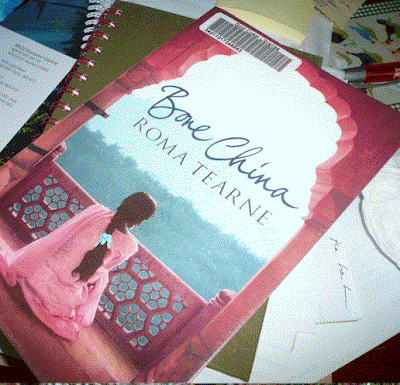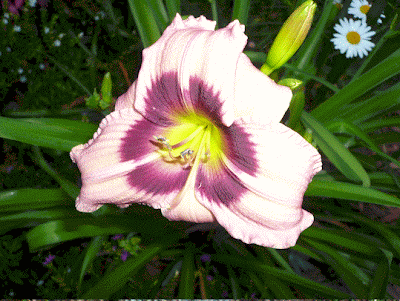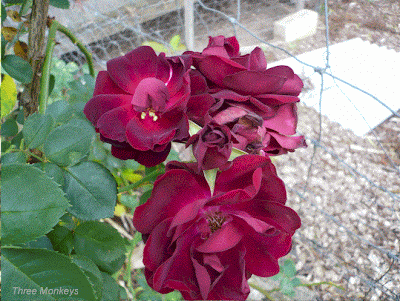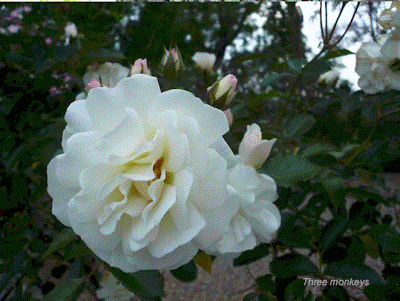 Naive Painting by Willi Keller;
Naive Painting by Willi Keller;
The house is build of wood. Where the reddish wood stain has worn off it shows aged, silvery markings. The windows under a protruding roof, give it the appearance of an old woman, eyes twinkling from under a tightly knotted kerchief. The house is alive it makes particular noises at particular times. It creaks, deeply sighs, occasionally it also laughs. More often though it moans and wails especially in winter with a heavy load of snow pressing on its low roof.
In summertime the house looked festive and pretty, dressed up with window boxes densely planted with pink and red Geraniums mingled with prickly Asparagus fern lolling over the rims in graceful swags. The window displays were a summer highlight we always looked forward to. As soon as the weather got warmer and the fear of frost was over we lugged all the window boxes from the cellar and placed them outside the windows. The plants were cut back severely to their last eye, thoroughly watered and fertilized.
From late spring through summer until autumn the geraniums flowered in abundance with little help from us, only the removals of spend flower heads and once a week watering. Most houses in the village featured window boxes. Some were planted with big, bold pansies or petunias in red and white their most popular colours. The most beautiful were the Fuchsias displaying their flowers with their ballerina skirts from the darkest purple to the softest pink.
From the entrance leads a fairly steep, wooden staircase up to the living quarters.
The living room has two big windows in front and a small one at one side of the room. In the middle of a thick, dark red carpet stands a wooden table an embroidered tablecloth spread over it; an ornate crystal vase holds a few sprigs of flowers or in winter twigs of fir. The scent of Mimosa, small, fluffy and delicate flower balls linger on.
Mimosa didn’t grow in our garden. My mother said, they were imported from Nice an alluring name suitable to these fragrant sunshine yellow flowers. Wooden chairs with elaborately carved backs completed the setting. Along one wall is a sofa which doubles as a bed for visitors staying over night an occasion that didn’t happen often. My fathers’ appellation for this corner was the boudoir. The sofa was opulent, embellished with a fancy throw ornate with whorls and leaves in gold and silver threads. Plump, fat cushions with tassels, flounces and ruffles, ruched and embroidered in silks were arranged in drifts.
Opposite The dresser contained my mothers nice glasses and china used only for guests or at Christmas. On top of the dresser was the wedding photo in a silver frame of my parents. They were somber looking towards a future they had not yet experienced together, my mother holding tightly a bunch of roses.
The sewing machine, when not in use served as a small table. It took up the other corner together with a gramophone that gave its best in entertaining us with frivolous operettas and famous arias.
The records were heavy and shattered easily when I was unfortunate to drop one. Sometimes the needles scratched the record and then there were little hiccups in the music. These incidents didn’t lower my enthusiasm.
The big, black stove with shiny brass trimmings keeps us warm and comfortable in the long, freezing winter month. It has two openings with small doors and one drawer for the ashes. The upper opening was used to keep food warm or to roast apples.
The top of the stove was used to keep the nightclothes and the cherry stone bags warm to take to bed, as none of the bedrooms had heating. On Sundays the yeasty cake mixture was also left there to rise. Once, I had just received a beautiful doll for Christmas I used the top opening of the stove as a hospital for my doll, when I took her out the doll had a big hole at the back of her head and her bottom where the heat of the stove had touched it. The doll was made from celluloid and melted.
In front of the big windows my parents had each an armchair with a small, carved table. I was not allowed to use the chairs I had my own little chair and table.
The walls were hung with hunt trophies. One red and one black squirrel with soft bushy tails mounted on branches in a never changing pose looked at you with a rigid stare.
An owl with mournful, unblinking eyes and dusty plumage made ready to fly off. There were also many different sizes of antlers and horns of chamois. Each had its own plaque neatly written with the dates and location where the animals came from. My mother would have preferred pictures however every year a few more trophies were added to the collection. With time my mother didn’t object anymore, I guess she got used to them. I liked them and didn’t mind cleaning them from time to time with a soft moist cloth.
In autumn when my father went hunting, he send home by train one or two roebucks or chamois. There were always many of these animals laying on the platform of the station. Each had the address of the family it went to around its neck. I went between the dead animals in a matter of fact way trailing my hands over their soft furs and looking at their dull staring eyes. I didn’t feel sorry for them, it was just the way it was and I didn’t think about these animals how they felt when they were alive.
The meat would be cooked in red wine, juniper berries, laurel leaves and other herbs to make a tasty sauce. When ready the meat was ladled into preserving jars and kept on shelves until winter when it was consumed with much relish.
Our dining room was tiny. There were two corner benches, a smallish table and two more chairs, a potbelly stove and also a sofa that could be converted into a bed. This room had one odd, huge window that extended along the whole wall. As the roof was protruding this big window let in a lot of daylight and made the small room to look like an enclosed veranda. Behind the dining room door hung my fathers’ guns.
The bedroom of my parents was the most elaborately furnished, with mahogany beds, wardrobes, dresser and night tables. The room was so full one could hardly move. It had only one small window that was shaded by the overhanging roof and as it got practically no sunshine the room was kept in perpetual mourning. My father naming it the funeral parlour didn’t amuse my mother; she thought it was not funny. My father gave all the rooms names, made even small labels to stick onto doors. My room was the sparrows’ nest and the dining room was the noble one. He liked to tease my mother.
The kitchen was my favourite. The window was facing south and made the kitchen sunny and comfortable in summer and warm and cozy in winter as the big wood heated range was never without fire. It included a big copper container to heat water we called “the ship”. In the warm summer month my mother cooked on a small electric range. The floor was laid in dark red hexagonal tiles that in summer were nice and cool to the bare feet. In winter a Persian carpet, its once brilliant colours not distinguishable any more was placed over the tiles. I liked the kitchen best in summer. The shutters were half closed, the window open, a soft breeze slightly fanning white, filmy curtains. When I came from the stark sunlit outside into this cool and caressing light, the smell of warmth and well being embraced me and I felt utterly happy.
I wished everything would stay like this forever and ever. I felt it especially when I returned from a holiday for a couple of month with more or less strange people. The very familiarity of the kitchen brought an ache to my heart. I was back home and nothing had changed. The old dresser with its fading blue paint, the cupboard with its flowery mousseline curtain, my mother took the doors off because they always jammed. The porcelain sink with little chinks around the rim, the pots and pans neatly arranged above the polished, wood fired range. The small table spread with its usual blue and white cloth, everything was there waiting.
Downstairs was the laundry with a bathroom. There was a big copper to boil the laundry and heat water once a week for our bath. Two sinks to do the washing and rinsing of the laundry. My mother did the laundry usually once a month. It used to be very hard work and a long day. Sometimes a woman from the village, a friend came and helped and my mother helped her in return.
Every Saturday we had our bath. I had mine in a big zinc tub up in the kitchen before the hot stove. My mother and my father had theirs together in the big bathtub downstairs in the laundry. They had a lot of fun together. When I tried to join them I was shut out and all I could hear was their splashing and my mothers’ delightful laughter. After their bath they appeared scrubbed with rosy, smug faces.
As long as I know I always liked the garden. We had two gardens to look after. One was to grow vegetables the other was for flowers my mothers passion. A paling fence surrounded the flower garden. The wood was grey and silvery smooth to the touch from years in sun, rain and snow. Near the gate in the left corner grew a rosebush. It was very old and gnarled yet bloomed every year with the sweetest scented snow-white roses with golden yellow centers. The roses once open wilted soon yet there was such a succession of opening buds it seemed to be bedecked in roses all summer long. The blooms were double, small, swarming with insects. I loved that rosebush. I buried my nose into the open flowers and sometimes a small black insect crawled up my nose and made me sneeze.
We had clumps of wine red, blowsy peonies of which I always thought to be the mothers of all the other flowers. They sort of looked stout and stern; they didn’t have an alluring scent yet they were always there for comfort. We also had long rows of pristine white Madonna lilies growing. Their heavy, plump buds were a challenge, when I was small I praised them open to look at the inside. My mother was not amused and my curiosity was cured with a few stinging slaps.
Golden Solidago flowered all summer along the fence. My mother wanted to ban it from the garden she said it was just a weed. I thought it was beautiful, so tall with its swishing yellow heads kissed by the sun. Somehow I persuaded my mother to leave it alone and so it bloomed every summer.
I didn’t like changes. I wanted everything to stay as it always was. I didn’t know that changes were part of life. Changes were frightening and I didn’t like to acknowledge them.
The garden beds along the fence were closely planted with asters in hues from purple to pink and dark red. Stiff, tall Zinnias holding their colourful heads high above the others asked for special attention. Poppies with vulnerable papery petals and sky-blue Forget-me-not intermingling, most of them grew on their own volition, from their freely scattered seeds.


















































